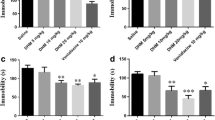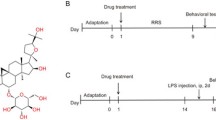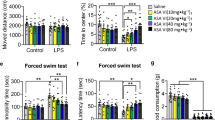Abstract
Neuroinflammation contributes to the pathogenesis of depression. Inulin-type oligosaccharides of Morinda officinalis (IOMO) exert antidepressant-like effects in rodents and patients with depression, while the underlying mechanisms remain unclear. This study used chronic restraint stress (CRS) and lipopolysaccharide (LPS) to induce depression-like behaviors in mice. Western blotting and ELISA analysis were used to investigate the effects of IOMO on inflammatory cytokine levels. Immunofluorescence analysis was used to investigate the effects of IOMO on hippocampal NLRP3 inflammasome and microglial cells. The results suggested that 6 weeks of CRS induced significant depression-like behaviors based on the sucrose preference test (SPT), tail suspension test (TST), and forced swimming test (FST), which were accompanied by increases in the expression of IL-6 and the activation of hippocampal microglial cells. Chronic treatment with IOMO (25 mg/kg, i.g.) for 28 days significantly reversed these depression-like behaviors and inhibited the activation of microglial cells. Furthermore, LPS (0.5 mg/kg, i.p.) also significantly induced depression-like behaviors in the TST, FST, and novelty-suppressed feeding test (NSFT), as well as increased the expression of IL-1β and caspase-1, and activated the microglial cells and the NLRP3 inflammasome in the hippocampus. Treatment with IOMO for 9 days significantly reversed these depression-like behaviors and normalized the LPS-induced activation of the microglial cells and NLRP3 inflammasome. Taken together, these results suggested that IOMO exerted antidepressant-like effects via hippocampal microglial NLRP3 inflammasome mediation followed by caspase-1 inhibition and the production of IL-1β. These findings provide a basis for developing new antidepressants targeting the microglial NLRP3 inflammasome.






Similar content being viewed by others
Data Availability
The datasets used or analyzed during the current study are available from the corresponding author on reasonable request.
Code Availability
Not applicable.
References
Beurel E, Toups M, Nemeroff CB (2020) The bidirectional relationship of depression and inflammation: double trouble. Neuron 107(2):234–256. https://doi.org/10.1016/j.neuron.2020.06.002
Bian H, Wang G, Huang J, Liang L, Zheng Y, Wei Y, Wang H, Xiao L, Wang H (2020) Dihydrolipoic acid protects against lipopolysaccharide-induced behavioral deficits and neuroinflammation via regulation of Nrf2/HO-1/NLRP3 signaling in rat. J Neuroinflammation 17(1):166. https://doi.org/10.1186/s12974-020-01836-y
Chai Y, Cai Y, Fu Y, Wang Y, Zhang Y, Zhang X, Zhu L, Miao M, Yan T (2022) Salidroside ameliorates Depression by suppressing NLRP3-Mediated pyroptosis via P2X7/NF-κB/NLRP3 signaling pathway. Front Pharmacol 13:812362. https://doi.org/10.3389/fphar.2022.812362
Chen Y, Xiong W, Zhang Y, Bai X, Cheng G, Zhang Y, Chen R, Guo Y, Kong H, Zhang Y, Qu H, Zhao Y (2022) Carbon Dots Derived from Os Draconis and their anxiolytic effect. Int J Nanomedicine 17:4975–4988. https://doi.org/10.2147/ijn.S382112
Chi L, Khan I, Lin Z, Zhang J, Lee MYS, Leong W, Hsiao WLW, Zheng Y (2020) Fructo-oligosaccharides from Morinda officinalis remodeled gut microbiota and alleviated depression features in a stress rat model. Phytomedicine 67:153157. https://doi.org/10.1016/j.phymed.2019.153157
Dang R, Wang M, Li X, Wang H, Liu L, Wu Q, Zhao J, Ji P, Zhong L, Licinio J, Xie P (2022) Edaravone ameliorates depressive and anxiety-like behaviors via Sirt1/Nrf2/HO-1/Gpx4 pathway. J Neuroinflammation 19(1):41. https://doi.org/10.1186/s12974-022-02400-6
Dong Y, Li S, Lu Y, Li X, Liao Y, Peng Z, Li Y, Hou L, Yuan Z, Cheng J (2020) Stress-induced NLRP3 inflammasome activation negatively regulates fear memory in mice. J Neuroinflammation 17(1):205. https://doi.org/10.1186/s12974-020-01842-0
Du Y, Zheng Q, Ou ZH, Cao YJ, Su XP, Li C, Qu M (2021) Efficacy and safety of Morinda officinalis oligosaccharide capsules for depressive disorder: a systematic review and meta-analysis. Braz J Psychiatry 43(3):306–313. https://doi.org/10.1590/1516-4446-2020-0945
Du Preez A, Onorato D, Eiben I, Musaelyan K, Egeland M, Zunszain PA, Fernandes C, Thuret S, Pariante CM (2021) Chronic stress followed by social isolation promotes depressive-like behaviour, alters microglial and astrocyte biology and reduces hippocampal neurogenesis in male mice. Brain Behav Immun 91:24–47. https://doi.org/10.1016/j.bbi.2020.07.015
Duan N, Zhang Y, Tan S, Sun J, Ye M, Gao H, Pu K, Wu M, Wang Q, Zhai Q (2022) Therapeutic targeting of STING-TBK1-IRF3 signalling ameliorates chronic stress induced depression-like behaviours by modulating neuroinflammation and microglia phagocytosis. Neurobiol Dis 169:105739. https://doi.org/10.1016/j.nbd.2022.105739
Fang Y, Guo H, Wang Q, Liu C, Ge S, Yan B (2022) The role and mechanism of NLRP3 inflammasome-mediated astrocyte activation in dehydrocorydaline against CUMS-induced depression. Front Pharmacol 13:1008249. https://doi.org/10.3389/fphar.2022.1008249
Festing MF (2018) On determining sample size in experiments involving laboratory animals. Lab Anim 52(4):341–350. https://doi.org/10.1177/0023677217738268
Han X, Xu T, Fang Q, Zhang H, Yue L, Hu G, Sun L (2021) Quercetin hinders microglial activation to alleviate neurotoxicity via the interplay between NLRP3 inflammasome and mitophagy. Redox Biol 44:102010. https://doi.org/10.1016/j.redox.2021.102010
Hao Q, Zhou J, Zhou L, Kang L, Nan T, Yu Y, Guo L (2020) Prediction the contents of fructose, glucose, sucrose, fructo-oligosaccharides and iridoid glycosides in Morinda officinalis radix using near-infrared spectroscopy. Spectrochim Acta A Mol Biomol Spectrosc 234:118275. https://doi.org/10.1016/j.saa.2020.118275
Jia X, Gao Z, Hu H (2021) Microglia in depression: current perspectives. Sci China Life Sci 64(6):911–925. https://doi.org/10.1007/s11427-020-1815-6
Kouba BR, Gil-Mohapel J, AL SR (2022) NLRP3 inflammasome: from pathophysiology to therapeutic target in major depressive disorder. Int J Mol Sci 24(1). https://doi.org/10.3390/ijms24010133
Kraeuter AK, Guest PC, Sarnyai Z (2019) The Open Field Test for measuring locomotor activity and anxiety-like Behavior. Methods Mol Biol 1916:99–103. https://doi.org/10.1007/978-1-4939-8994-2_9
Li W, Ali T, He K, Liu Z, Shah FA, Ren Q, Liu Y, Jiang A, Li S (2021a) Ibrutinib alleviates LPS-induced neuroinflammation and synaptic defects in a mouse model of depression. Brain Behav Immun 92:10–24. 10.1016/j.bbi.2020.11.008
Li W, Ali T, Zheng C, Liu Z, He K, Shah FA, Ren Q, Rahman SU, Li N, Yu ZJ, Li S (2021b) Fluoxetine regulates eEF2 activity (phosphorylation) via HDAC1 inhibitory mechanism in an LPS-induced mouse model of depression. J Neuroinflammation 18(1):38. 10.1186/s12974-021-02091-5
Li B, Yang W, Ge T, Wang Y, Cui R (2022a) Stress induced microglial activation contributes to depression. Pharmacol Res 179:106145. 10.1016/j.phrs.2022a.106145
Li S, Fang Y, Zhang Y, Song M, Zhang X, Ding X, Yao H, Chen M, Sun Y, Ding J, Wang Q, Lu M, Wu G, Hu G (2022b) Microglial NLRP3 inflammasome activates neurotoxic astrocytes in depression-like mice. Cell Rep 41(4):111532. 10.1016/j.celrep.2022b.111532
Liang J, Liang J, Hao H, Lin H, Wang P, Wu Y, Jiang X, Fu C, Li Q, Ding P, Liu H, Xiong Q, Lai X, Zhou L, Chan S, Hou S (2017) The extracts of Morinda officinalis and its hairy roots attenuate Dextran Sodium Sulfate-Induced Chronic Ulcerative Colitis in mice by regulating inflammation and lymphocyte apoptosis. Front Immunol 8:905. https://doi.org/10.3389/fimmu.2017.00905
Liu MY, Yin CY, Zhu LJ, Zhu XH, Xu C, Luo CX, Chen H, Zhu DY, Zhou QG (2018a) Sucrose preference test for measurement of stress-induced anhedonia in mice. Nat Protoc 13(7):1686–1698. 10.1038/s41596-018-0011-z
Liu Y, Zhang Y, Zheng X, Fang T, Yang X, Luo X, Guo A, Newell KA, Huang XF, Yu Y (2018b) Galantamine improves cognition, hippocampal inflammation, and synaptic plasticity impairments induced by lipopolysaccharide in mice. J Neuroinflammation 15(1):112. 10.1186/s12974-018-1141-5
Liu S, Fan M, Xu JX, Yang LJ, Qi CC, Xia QR, Ge JF (2022) Exosomes derived from bone-marrow mesenchymal stem cells alleviate cognitive decline in AD-like mice by improving BDNF-related neuropathology. J Neuroinflammation 19(1):35. https://doi.org/10.1186/s12974-022-02393-2
Malhi GS, Mann JJ (2018) Depression. Lancet 392(10161):2299–2312. https://doi.org/10.1016/s0140-6736(18)31948-2
Osimo EF, Pillinger T, Rodriguez IM, Khandaker GM, Pariante CM, Howes OD (2020) Inflammatory markers in depression: a meta-analysis of mean differences and variability in 5,166 patients and 5,083 controls. Brain Behav Immun 87:901–909. https://doi.org/10.1016/j.bbi.2020.02.010
Ruilian L, Honglin Q, Jun X, Jianxin L, Qingyun B, Yilin C, Haifeng M (2021) H(2)S-mediated aerobic exercise antagonizes the hippocampal inflammatory response in CUMS-depressed mice. J Affect Disord 283:410–419. https://doi.org/10.1016/j.jad.2021.02.005
Su Q, Tao W, Huang H, Du Y, Chu X, Chen G (2016) Protective effect of liquiritigenin on depressive-like behavior in mice after lipopolysaccharide administration. Psychiatry Res 240:131–136. https://doi.org/10.1016/j.psychres.2016.04.002
Sun Y, Zhang H, Wu Z, Yu X, Yin Y, Qian S, Wang Z, Huang J, Wang W, Liu T, Xue W, Chen G (2021) Quercitrin rapidly alleviated Depression-like Behaviors in Lipopolysaccharide-Treated mice: the involvement of PI3K/AKT/NF-κB signaling suppression and CREB/BDNF signaling restoration in the Hippocampus. ACS Chem Neurosci 12(18):3387–3396. https://doi.org/10.1021/acschemneuro.1c00371
Swanson KV, Deng M, Ting JP (2019) The NLRP3 inflammasome: molecular activation and regulation to therapeutics. Nat Rev Immunol 19(8):477–489. https://doi.org/10.1038/s41577-019-0165-0
Tang M, Liu T, Jiang P, Dang R (2021) The interaction between autophagy and neuroinflammation in major depressive disorder: from pathophysiology to therapeutic implications. Pharmacol Res 168:105586. https://doi.org/10.1016/j.phrs.2021.105586
Troubat R, Barone P, Leman S, Desmidt T, Cressant A, Atanasova B, Brizard B, Hage E, Surget W, Belzung A, C., Camus V (2021) Neuroinflammation and depression: a review. Eur J Neurosci 53(1):151–171. https://doi.org/10.1111/ejn.14720
Walker AK, Wing EE, Banks WA, Dantzer R (2019) Leucine competes with kynurenine for blood-to-brain transport and prevents lipopolysaccharide-induced depression-like behavior in mice. Mol Psychiatry 24(10):1523–1532. https://doi.org/10.1038/s41380-018-0076-7
Wang H, He Y, Sun Z, Ren S, Liu M, Wang G, Yang J (2022) Microglia in depression: an overview of microglia in the pathogenesis and treatment of depression. J Neuroinflammation 19(1):132. https://doi.org/10.1186/s12974-022-02492-0
Won E, Na KS, Kim YK (2021) Associations between Melatonin, Neuroinflammation, and brain alterations in Depression. Int J Mol Sci 23(1). https://doi.org/10.3390/ijms23010305
Xia CY, Guo YX, Lian WW, Yan Y, Ma BZ, Cheng YC, Xu JK, He J, Zhang WK (2023) The NLRP3 inflammasome in depression: potential mechanisms and therapies. Pharmacol Res 187:106625. https://doi.org/10.1016/j.phrs.2022.106625
Yang HL, Li MM, Zhou MF, Xu HS, Huan F, Liu N, Gao R, Wang J, Zhang N, Jiang L (2021) Links between gut dysbiosis and neurotransmitter disturbance in Chronic Restraint Stress-Induced Depressive Behaviours: the role of inflammation. Inflammation 44(6):2448–2462. https://doi.org/10.1007/s10753-021-01514-y
Zhang B, Wang PP, Hu KL, Li LN, Yu X, Lu Y, Chang HS (2019) Antidepressant-like Effect and mechanism of action of Honokiol on the mouse lipopolysaccharide (LPS) Depression Model. Molecules 24(11). https://doi.org/10.3390/molecules24112035
Zhang Y, Anoopkumar-Dukie S, Mallik SB, Davey AK (2021) SIRT1 and SIRT2 modulators reduce LPS-induced inflammation in HAPI microglial cells and protect SH-SY5Y neuronal cells in vitro. J Neural Transm (Vienna) 128(5):631–644. https://doi.org/10.1007/s00702-021-02331-1
Zhao X, Cao F, Liu Q, Li X, Xu G, Liu G, Zhang Y, Yang X, Yi S, Xu F, Fan K, Ma J (2019) Behavioral, inflammatory and neurochemical disturbances in LPS and UCMS-induced mouse models of depression. Behav Brain Res 364:494–502. https://doi.org/10.1016/j.bbr.2017.05.064
Zhong J, Li G, Xu H, Wang Y, Shi M (2019) Baicalin ameliorates chronic mild stress-induced depression-like behaviors in mice and attenuates inflammatory cytokines and oxidative stress. Braz J Med Biol Res 52(7):e8434. https://doi.org/10.1590/1414-431x20198434
Zhu J, Peng Q, Xu Y, Xu H, Wan Y, Li Z, Qiu Y, Xia W, Guo Z, Li H, Jin H, Hu B (2020) Morinda officinalis oligosaccharides ameliorate depressive-like behaviors in poststroke rats through upregulating GLUT3 to improve synaptic activity. Faseb j 34(10):13376–13395. https://doi.org/10.1096/fj.201902546RR
Zou W, Feng R, Yang Y (2018) Changes in the serum levels of inflammatory cytokines in antidepressant drug-naïve patients with major depression. PLoS ONE 13(6):e0197267. https://doi.org/10.1371/journal.pone.0197267
Funding
This work was supported by STI2030-Major Projects (No. 2021ZD0200900) and the National Natural Science Foundation of China (No. 81773708).
Author information
Authors and Affiliations
Contributions
Zhao-Kai Lai and Yong-Yu Yin performed the research design, behavioral tests, immunofluorescence, ELISA, western blotting experiments, data analysis, and wrote the manuscript. Jiao-Zhao Yan contributed to the behavioral tests and immunofluorescence experiments. Qian-Qian Wei helped with the behavioral tests and writing the manuscript. Bin Wang helped with the immunofluorescence experiments. Yun-Feng Li, Li-Ming Zhang, and Yu-Lu Wang contributed to the research design and revised the manuscript. All authors approved the final manuscript.
Corresponding authors
Ethics declarations
Ethics approval
Not applicable.
Consent to participate (include appropriate statements)
Not Applicable.
Consent for publication (include appropriate statements)
Not Applicable.
Competing Interests
The authors declare that there are no conflicts of interest.
Additional information
Publisher’s Note
Springer Nature remains neutral with regard to jurisdictional claims in published maps and institutional affiliations.
Rights and permissions
Springer Nature or its licensor (e.g. a society or other partner) holds exclusive rights to this article under a publishing agreement with the author(s) or other rightsholder(s); author self-archiving of the accepted manuscript version of this article is solely governed by the terms of such publishing agreement and applicable law.
About this article
Cite this article
Lai, ZK., Yin, YY., Yan, JZ. et al. Inulin-type oligosaccharides of Morinda officinalis exerted antidepressant effects by reducing hippocampal inflammation. Metab Brain Dis 38, 2065–2075 (2023). https://doi.org/10.1007/s11011-023-01223-5
Received:
Accepted:
Published:
Issue Date:
DOI: https://doi.org/10.1007/s11011-023-01223-5




